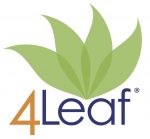Health promotion is all about what you DO eat, not what you’re avoiding.
4Leaf is a simple, flexible eating concept that is all about maximizing the percentage of your calories from whole, plant-based foods. We want to do that by always stressing the positive, beginning with this statement:
4Leaf is not a diet; it is a permanent lifestyle change.
First, let’s define “whole, plant-based foods.” Basically, they are foods that are still in nature’s package. This includes all fresh fruit, vegetables, legumes, potatoes, nuts, seeds and whole grains. Your mother probably told you a million times that you should eat more fruits and vegetables. We want to build on that simple, positive advice.

Copyright © 2019 4Leaf Global, LLC
So, what about plant-based foods like bread, pasta, and tofu? While these foods are plant-based, they have been processed and simply don’t contain the nutrient density and health-promoting qualities of those foods that are still in nature’s package. We have also observed that many people who load up on these kinds of foods often don’t get the results that they’re expecting to see from a truly health-promoting way of eating.
To be clear, we’re not saying that you have to give up bread, pasta, wine, or tofu; we’re saying that you should try to get over 80% of your daily calories from whole plants.
What is 4Leaf not? 4Leaf is not necessarily vegan or vegetarian; those diets focus primarily on what you’re avoiding, whereas 4Leaf is focused on maximizing the consumption of the healthiest of foods: whole plants.
To get a better idea of the 4Leaf program, see the descriptions of the eating levels below, beginning with the healthiest.

4Leaf Level. With over 80% of daily calories derived from whole plant foods
Representing a small minority of the population, people in this group tend to have trim bodies, vibrant health, lots of energy, take no medications, almost never have any disease and will likely live a long, healthy lives.

3Leaf Level. With over 60% of calories derived from whole plant foods
Already eating a superior diet, this group is deriving well over half of its calories from health-promoting, whole, plant foods, and have experienced many benefits of healthy eating. People in this group are right on the verge of eating 4Leaf.

2Leaf Level. With over 40% of calories derived from whole plant foods
Although probably making a serious effort to eat a healthy, balanced diet, this group is falling short of ensuring long-term vibrant health. We have found that with a little help, folks in this group can easily move up to 4Leaf eating.

1Leaf Level. Over 20% of calories derived from whole plant food
Although eating four to five times more whole plants than the majority of folks, this group is not consuming enough of them to provide much protection against disease. After taking our 4Leaf survey, they’ll know what to do.
Better Than Most (BTM) Less than 20% of calories derived from whole plants
People at this level are actually trying to eat a healthier diet. They frequently say things like “I have given up red meat and am trying to watch what I eat.” All they need is a better understanding of what promotes vibrant health.
Unhealthful Diet (UD) Less than 10% of calories derived from whole plants
People in this group eat the typical Western diet with meat, dairy, eggs, fish and/or highly-processed foods at almost every meal. This is a very destructive diet-style, eaten by approximately 65% of the Western world. It provides almost no fiber from whole plants and offers zero protection against chronic diease.
If you’re interested in seeing where you currently stand on our scale, click here to take the online survey. Once you’ve established your baseline, you can check out the rest of the 4Leaf 101 section that includes tools to assist with your improvement.
CAUTION. Eating this way may quickly decrease your need for medications. You should tell your physician what you’re doing. If he/she is unfamiliar with or skeptical of this eating-style, please direct him or her to nutritionstudies.org and plantrician.org.

